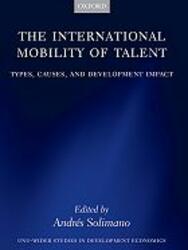Book Chapter
Causes and Consequences of Talent Mobility
This chapter takes a fresh look at the topic of international mobility examining talented and highly educated individuals. It highlights the potential of ‘brain circulation’ embedded in the greater mobility of graduate students, professionals, information technology experts, entrepreneurs, cultural workers, and others in the world economy. In some fields, such the global health sector, the concerns of brain and human resource drains are still very valid. The research in this book and the literature on the topic have identified several factors that affect the mobility of different types of talent such as international differences in earnings and development gaps, the demand for capital and new technologies, concentration effects and the location of capital, markets and talent, and policy regimes and immigration policies in recipient countries. The effects of talent mobility on international development, economic growth, income disparities, international transfers of technology, and the circulation of ideas are herein investigated by expert international contributors.
 Join the network
Join the network